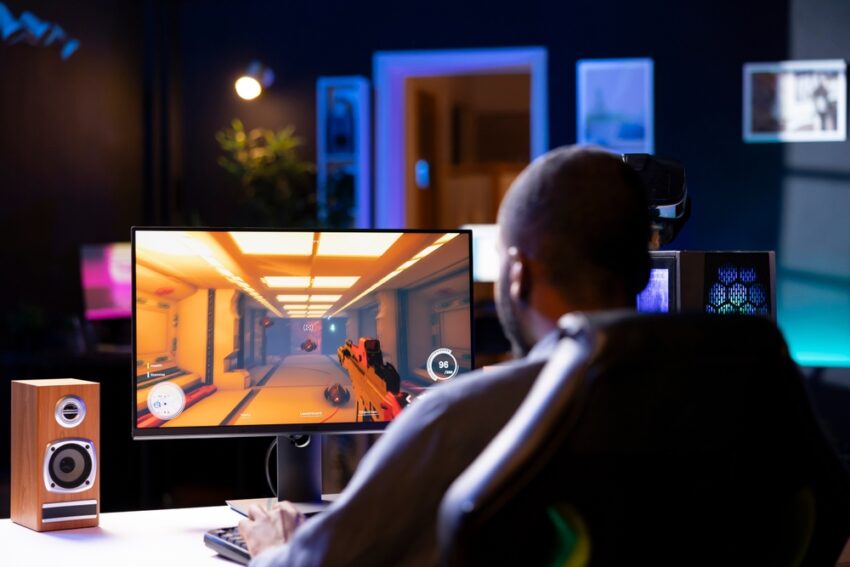Gaming doesn’t have to cost a fortune. With the right approach, you can build a gaming PC that delivers solid performance while staying within a budget.
Whether you’re a casual player or aiming to climb the competitive ladder, this guide will walk you through building a cheap gaming PC in the UK, tailored to your needs and your wallet.
1. Set a Clear Budget
Decide how much you’re willing to spend. For UK gamers, a budget build can start around £500–£600, while a mid-range option may range between £700–£900. Knowing your budget will help you allocate funds wisely across the components.
2. Essential Components for Your Build
Here’s a detailed breakdown of what you’ll need and where you can find the best value:
- CPU (Processor): For affordable yet reliable performance, consider AMD Ryzen 5 5600G (£120–£150) or Intel Core i3-13100F (£100–£130). Both offer great performance for their price.
- GPU (Graphics Card): For 1080p gaming, the NVIDIA GTX 1650 (£150–£180) or AMD RX 6500 XT (£160–£200) are excellent choices. If your budget allows, the RTX 3050 (£230–£270) or RX 6600 (£240–£280) provide more power.
- RAM: 16GB (2x8GB) DDR4 RAM is the standard for gaming. Look for speeds of at least 3200MHz, starting around £40–£60.
- Storage: A 500GB NVMe SSD (£25–£35) for fast load times, paired with a 1TB HDD (£30–£40) for additional storage, is ideal. Alternatively, a single 1TB SSD (£50–£60) can suffice if you’re prioritising speed.
- Motherboard: Choose a budget-friendly B550 (AMD) or B660 (Intel) motherboard. These are available for £80–£120 and support future upgrades.
- Power Supply Unit (PSU): A 500W-600W PSU from brands like Vibox, Corsair or EVGA (£40–£60) ensures stable power delivery.
- Case: A mid-tower case with good airflow can cost as little as £40. Look for brands like Cooler Master or Vibox for affordable options with added features like RGB lighting.
3. Where to Shop for Deals
- Retailers: Popular retailers in the UK like Vibox, Amazon, Currys, and Scan often run deals, especially during Black Friday or Boxing Day sales.
- Second-hand Market: Sites like eBay or Facebook Marketplace can offer great deals on used parts. Check CEX for GPUs with warranties.
- Bundles and Promotions: Keep an eye on retailers offering combo deals on CPUs, motherboards, and RAM.
4. Don’t Forget Peripherals
Building a PC doesn’t include peripherals like a monitor, keyboard, or mouse. Budget options are available for:
- Monitors: A 1080p 75Hz monitor can be found for £90–£120.
- Keyboard & Mouse: Gaming combos start from £30.
- Headsets: Decent gaming headsets begin at £25.
5. Assemble Your PC
Assembling a gaming PC is easier than you might think. Use online guides and videos to walk you through the process. Remember to ground yourself to avoid static damage and ensure components are securely installed.
6. Plan for Upgrades
A budget PC is an excellent starting point, but plan for upgrades like adding more RAM, a better GPU, or a higher refresh rate monitor as you save up.
7. Make Use of Free Software
Save money by using free or open-source software. For example, Windows 10 can be used without activation until you can afford a license key, and free antivirus programs like Avast or AVG can provide sufficient protection.
8. Use Cloud Gaming to Supplement Performance
If you’re saving for higher-end upgrades, consider cloud gaming services like NVIDIA GeForce NOW or Xbox Cloud Gaming. These services let you play demanding games on a budget system by offloading processing to the cloud. Subscriptions typically cost around £8–£15 per month, offering access to high-quality gaming without needing a powerful PC.
9. Check for Warranty and Return Policies
Always verify warranty terms and return policies when purchasing components. Many UK retailers and brands offer warranties ranging from 1 to 3 years. This is particularly important for parts like GPUs and PSUs, as they’re more expensive to replace. Having a warranty gives you peace of mind in case of defective parts.
8. Test and Optimise
Once your PC is running, test its performance with tools like Cinebench and 3DMark. Adjust game settings to find the perfect balance between quality and frame rate for a smooth gaming experience.
Conclusion
Building a budget gaming PC in the UK is entirely possible without compromising on performance. By making smart choices and taking advantage of deals, you can assemble a system that delivers exceptional gaming experiences for less. If you prefer a more customised build or need extra guidance, try using a PC builder tool like Vibox to streamline the process and ensure compatibility. Ready to start your build? Dive into the rewarding world of PC gaming today!


